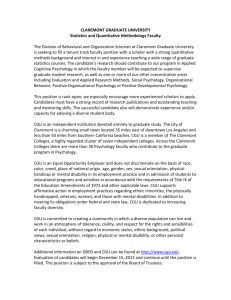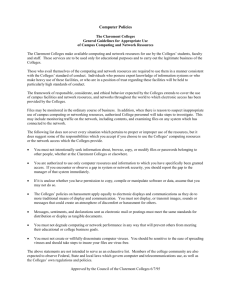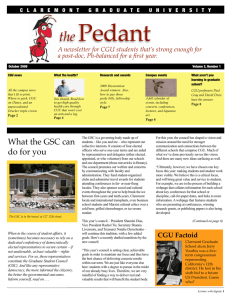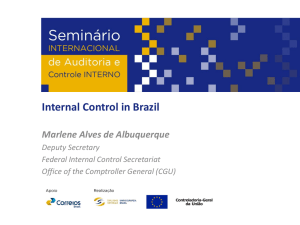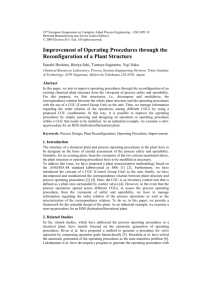Strategic Plan - Claremont Graduate University
advertisement
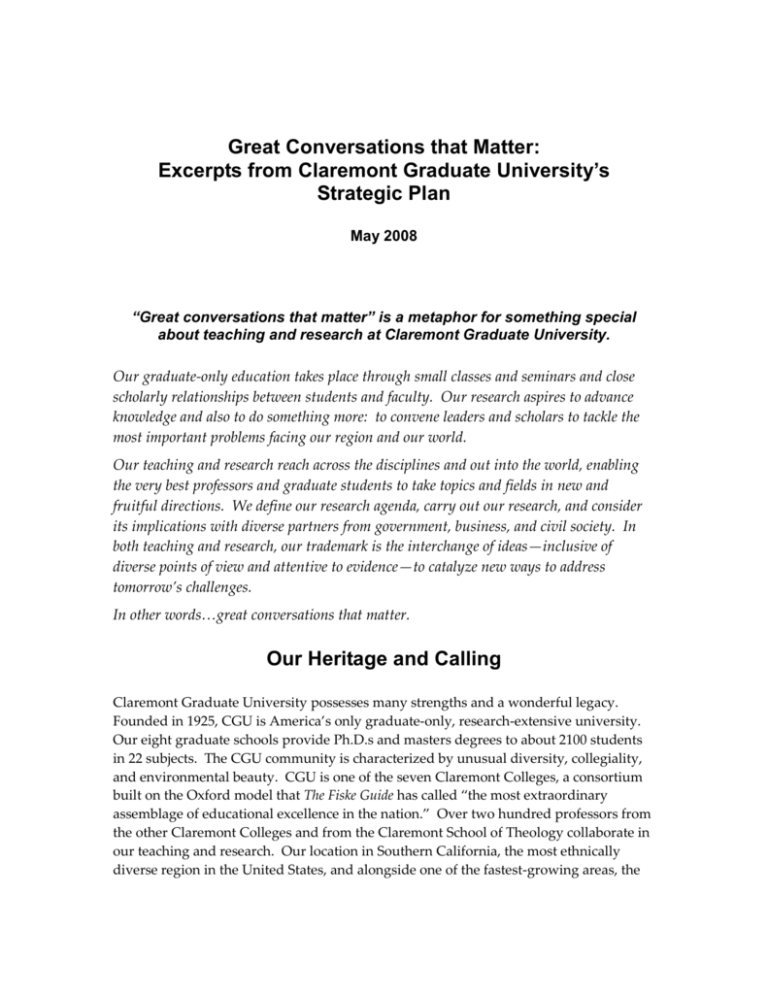
Great Conversations that Matter: Excerpts from Claremont Graduate University’s Strategic Plan May 2008 “Great conversations that matter” is a metaphor for something special about teaching and research at Claremont Graduate University. Our graduate-only education takes place through small classes and seminars and close scholarly relationships between students and faculty. Our research aspires to advance knowledge and also to do something more: to convene leaders and scholars to tackle the most important problems facing our region and our world. Our teaching and research reach across the disciplines and out into the world, enabling the very best professors and graduate students to take topics and fields in new and fruitful directions. We define our research agenda, carry out our research, and consider its implications with diverse partners from government, business, and civil society. In both teaching and research, our trademark is the interchange of ideas—inclusive of diverse points of view and attentive to evidence—to catalyze new ways to address tomorrow’s challenges. In other words…great conversations that matter. Our Heritage and Calling Claremont Graduate University possesses many strengths and a wonderful legacy. Founded in 1925, CGU is America’s only graduate-only, research-extensive university. Our eight graduate schools provide Ph.D.s and masters degrees to about 2100 students in 22 subjects. The CGU community is characterized by unusual diversity, collegiality, and environmental beauty. CGU is one of the seven Claremont Colleges, a consortium built on the Oxford model that The Fiske Guide has called “the most extraordinary assemblage of educational excellence in the nation.” Over two hundred professors from the other Claremont Colleges and from the Claremont School of Theology collaborate in our teaching and research. Our location in Southern California, the most ethnically diverse region in the United States, and alongside one of the fastest-growing areas, the Inland Empire, is a living laboratory for the study of important social trends, problems, and possibilities. Like other graduate institutions, Claremont Graduate University educates scholars, experts, and leaders and creates new knowledge through research. But CGU is nimble and free from many of the constraints faced by huge research universities. CGU can take distinctive approaches that produce an outsized impact on the world. We want people to ask, “How do they do that, they’re so small?” Our tradition says, “Follow the problem.” This means that our research and teaching transcend academic boundaries. Our University disregards artificial divides between theory and application. We believe that academic rigor and addressing big questions can go together. CGU’s first president, James Blaisdell, once said, “The center of a college is in great conversation, and out of the talk of college life springs everything else.” Our tradition values talking and listening across the disciplines, and taking on the big issues of our times. In our seminar rooms and through our research, our University catalyzes great conversations that matter. The expression “great conversations that matter” tries to capture what is special about our vision of graduate education and pathbreaking research. We educate superb economists and artists, mathematicians and managers—to name a few—who can engage in great conversations that matter. Conversations that are civil and humane, and value diversity in many dimensions. Conversations that aim to foster a better world. We want our graduates to have expertise, to appreciate diverse perspectives, to reframe problems, to be able to work in teams. We hope they care about more than financial success and social standing. What we teach, and how, derives from these objectives. Our long-standing model is students-as-apprentices—meaning, really, students-as-colleagues. We have pioneered transdisciplinary doctoral courses and “the Claremont Conversation for the 21st Century,” an online tool for building intellectual community. Our research also tries to create great conversations that matter. Through a combination of bold yet grounded research and the convening of leaders from academia, business, government, and communities, Claremont Graduate University works with others to generate new thinking on some of the hardest problems facing our region and our world. Each of the nine schools of Claremont Graduate University has developed a strategy that emphasizes these themes. 1 The Drucker School is carrying forward the legacy of Peter Drucker to address “the responsibility gap,” namely the widespread shortfalls in ethical leadership and effective management in the United States and elsewhere. The School of Educational Studies emphasizes both social justice and accountability as it educates scholar-activists to transform public education. The School of Behavioral and Organizational Sciences is a national leader in evaluation, studying issues from education to health care, from individual wellbeing to civic engagement. Students at the School of Religion learn what it means to be inside a community of faith and also outside that community. We hope that the insider-outsider perspective can advance research and promote religious understanding and tolerance. The School of Politics and Economics creates synergies across those two fields to bring fresh perspectives to issues such as religion and politics; the “predictive modeling” of crisis points in the world; trust, collaboration, and “moral markets”; and globalization. The School of Information Systems and Technology explores the interfaces between people, information technology, and social progress. The Kay Center for E-Health explores how technology can improve the quality, reduce the risks, and lower the costs of health care, especially for the disabled. In “theoretical” work in the humanities, disciplinary silos tend to preclude richer understandings of times and places. Our world needs the knowledge, sensitivities, and skills of the arts and humanities. Yet, few graduate schools enable their students to reach across disciplinary boundaries and out into the world. Our School of Arts and Humanities does. The School of Mathematical Sciences has positioned itself to advance areas of national need: computational biology, computational science, and industrial applied mathematics. It has pioneered “clinics,” where students and professors work with businesses or government agencies on problems of practical importance. The School spearheads the new Claremont Center for the Mathematical Sciences, which spans all seven of the Claremont Colleges. CGU’s newest addition, the School of Community and Global Health, addresses the behavioral and well-being aspects of some of tomorrow’s most challenging health issues. In each of these areas, we focus on distinctive programs of intellectual value and 2 practical importance. Through our strategic planning we have reminded ourselves that our Schools share the audacious goals of providing leadership in graduate education and making a difference on some of the region’s and the world’s most important problems. We have learned that working together we have the potential to do both. Our Strategic Goals Goal 1. Leadership in Graduate Education CGU provides leadership in three areas: the Ph.D., management, and graduate study in education. Other universities emulate our syllabi, seminars, and online presence. Our graduates are sought as well-prepared scholars, thought leaders, and creative practitioners. Intimate, Transdisciplinary, and Engaged with the World Many graduate schools are criticized for being impersonal, narrow, and divorced from the world. In contrast, the CGU experience is intimate, transdisciplinary, and engaged with the world. Our Ph.D. students often cross disciplinary boundaries and emphasize applications to the world outside the university. All doctoral students are required to take a “transdisciplinary course.” They learn how transdisciplinary approaches can pay off both in the real world and also in advancing knowledge within the disciplines. CGU’s “Preparing Future Faculty” program addresses many critiques of the professional development of Ph.D. students elsewhere. In areas where graduate education nationally is failing or fragile, CGU is taking approaches that are exactly in the right direction. CGU’s Peter F. Drucker and Masatoshi Ito School of Management emphasizes what the father of modern management, Peter Drucker, espoused: values, the long term, a focus on the customer, putting people at the center, the social sector, and the knowledge economy. The faculty is distinguished by its research, and much of this research centers on fundamental issues in leadership and the practice of management. True, students at the Drucker School master finance, accounting, marketing, and the usual skills of a firstrate school of management. But at Drucker they take a bigger, longer-term look. Because they learn skills from business and the non-profit sector, even from government, they are prepared to create new institutional arrangements to deal with tomorrow’s challenges. Our School of Educational Studies combines a passion for social justice with an insistence on accountability. It is not either-or here, but both-and. Students and faculty 3 work on some of tomorrow’s most important educational issues. They meld disciplines and diverse experiences. Most of our Ph.D. students are scholar-practitioners, whose degree programs are tailor-made to their abilities and aspirations. Elsewhere, teacher training is criticized for being uninterested in the links between what teachers learn and experience and what the results eventually are for students. In contrast, CGU’s Teacher Education Program focuses on exactly these links. By deepening and sharing these approaches, we can inspire others. As we move ahead, our educational task is to be more like us. In our Ph.D. programs, we emphasize transdisciplinarity and following the problem. We enable professors and students to work across the boundaries of disciplines and Schools. We organize recruitment, teaching, requirements, and outreach to bring our distinctiveness to the fore. We wfocus on “the Drucker difference” in our education of leaders and managers. We enhance scholarship on both social justice and accountability in our School of Educational Studies. In all these areas, Claremont Graduate University will be a test bed for information and communications technologies that enhance intellectual community. Goal 2. Research on Some of the World’s Most Pressing Problems Claremont Graduate University is a leader in high-quality, objective research about some of the most important problems facing our region, our country, and our world. We inspire investment in CGU as a source of transformational, even “game-changing” ideas that offer a substantial return to our society. Our strategic planning has identified several cross-cutting priorities. 1. Ethical Leadership and Effective Management In May 2006, more than a hundred leading Drucker-like thinkers and practitioners gathered to help address two questions: What is Peter Drucker’s legacy, and how can we carry it forward in new ways to new audiences? This distinguished group answered that Drucker’s legacy is more than the man and his writing. Drucker’s legacy, they said, is a collection of ideas and ideals desperately needed by future generations of leaders responsible for the companies and communities in which we work and live. In response, Claremont Graduate University decided the best way to keep Drucker’s legacy alive was not simply to look backward (through the Drucker Archive) but to look 4 forward (by building on Drucker’s wisdom and applying it to important contemporary issues). Their mandate, in other words, was to transform the archival repository into a think tank and an action tank whose purpose is to stimulate effective management and ethical leadership across all sectors of society. Out of the Drucker Archives thus grew the Drucker Institute, a campus-wide resource closely aligned with the Drucker School, where Peter Drucker taught for 35 years and which continues to produce ethical leaders and effective managers for business, government, and civil society. Among the Institute’s activities is a research seminar on leadership that brings together 25 or so faculty members from across the Claremont Colleges, including graduate programs in leadership at CGU’s School of Behavioral and Organizational Sciences, the School of Educational Studies, and the Drucker School. The Institute awards the Drucker Prize for Nonprofit Innovation. Its distinguished visitors program brings to CGU some of the world’s most eminent thinkers. The Drucker Institute is the hub for Drucker Societies around the world, which bring international perspectives to the challenges of ethical leadership and effective management. 2. Redesigning Public Education Education has emerged as a priority area in our strategic planning. We believe that America’s system of public education is broken. A University-wide effort catalyzed by the School of Educational Studies will focus CGU’s intellectual resources on the challenges of redesigning public education—from classroom to school system, including public-private partnerships and the radical possibilities enabled by the information and communications revolutions. 3. Applied Mathematics CGU is the lead institution for the new Claremont Center for Mathematical Sciences Center, which promises benefits in Claremont and out into the world. The Center pulls together the 50 or so mathematicians in the Claremont Colleges to encourage collaboration in education, teacher training, research, and outreach. 1. Coalescing and sharing what the Claremont Colleges have learned from the faculty’s award-winning teaching of college-level mathematics. 2. Enhancing the training of mathematics teachers from diverse backgrounds. In partnership with Harvey Mudd College and USC, CGU is the second location in the country for Math for America. 3. Wholesaling the Claremont tradition of “math clinics,” through which students and faculty carry out applied research on important issues with sponsors in 5 business, government, and civil society. 4. Claremont What Works Consortium Decision makers clamor for better evidence about what works. In response, we see welcome advances in evaluation and new clearinghouses of “best practices.” Yet huge gaps remain. • Randomized controlled trials are a powerful source of information, but we must also gather and assimilate other sources of valuable information about what works (for example, from practitioners, case studies, “appreciative inquiry,” and other sources). • Examples of best practice often are simple descriptions, stopping short of “how to” for those wishing to adopt or adapt and leaving out vital questions of how to bring promising local successes to scale. On January 2008, CGU invited a hundred philanthropists, award-winning NGOs, business people, and academics from many disciplines to consider how to fill these gaps. An online forum followed, and the result is the creation of the Claremont What Works Consortium. Spearheaded by the School of Behavioral and Organizational Sciences, the CWWC mobilizes the others schools at CGU, the Claremont Colleges, and partners outside Claremont to: • Generate, analyze, and combine evidence from a variety of sources, including methods such as “appreciative inquiry,” and working with practitioners to gather evidence and examples, interpret them, and ascertain together their practical lessons. • Create and apply innovative research methods and pedagogical vehicles for connecting evaluation and decision, academy and practitioner. • Convene leaders from government, business, nongovernmental organizations to examine inspiring cases of progress, look at new theoretical approaches, and pull together the best information. 5. Community and Global Health CGU’s new School of Community and Global Health focuses on healthy lifestyles, with an emphasis on underserved communities. Building on professors coming to CGU from USC’s celebrated Institute for Disease Prevention and Health Promotion Research, the new School focuses on such topics as addiction, the world-wide obesity epidemic, and how research findings in prevention science can be translated into better policies and 6 practices. It is the hub of a Claremont-wide effort to improve health and well-being, drawing especially on the School of Information Systems and Technology, the School of Behavioral and Organizational Sciences, the Drucker School, and the Keck Graduate Institute of Applied Life Sciences. The result is nothing less than a new kind of school of public health. Other Research Of course there are many other important research endeavors and centers at CGU, and individual professors are always free to pursue their intellectual passions in the ways they see fit. A Place to Convene Our research appears in books, journals, and conference papers. In addition, CGU shares and deepens its research through “convenings” of leaders from business, government, and civil society. Our convenings have these features: 1. They enable hands-on learning and problem-solving … Using interactive and experiential learning, including case studies, appreciative inquiry, scenarios, gaming, and simulations. Enabling people to think together in new ways about problems and solutions. Creating the basis for new, action-oriented partnerships. 2. … among leaders from many sectors … Government, business, civil society, and education, including voices not often invited to the table. 3. … emphasizing new approaches … Based on the latest research about “what works where.” Taking into account diversity of many kinds. Considering new designs for policies and institutions, new metrics and incentives, new networks of expertise, and new systems of governance. 4. … with a focus on effective action. The convenings are not conceived as one-off events but as the beginnings of learning and problem-solving networks among the participants, eventually extending to a wider universe through virtual communities. A purpose-built venue for these “great conversations that matter” has priority in the 7 University’s plans. Next Steps Claremont Graduate University is a unique graduate-only university with a transdisciplinary, applied flavor, with strong but perhaps insufficiently developed “brand names,” part of a world-famous educational consortium, and located in a region that is a living laboratory for the study of broad social trends and challenges. CGU represents a different kind of university, one that values disciplinary excellence and also convenes great conversations across the disciplines and out into the world. We aspire to 1. provide leadership in graduate education and 2. take on some of the region’s and world’s most important problems with rigorous research and “convenings” of leaders and citizens from government, business, civil society, and academia. To do so, we will be “more like us,” with even loftier goals, even greater collaboration, and even more resources. We will emphasize and enhance what we do distinctively well—our transdisciplinary education and research that addresses the big issues facing our society. Everything we do will bear the Claremont hallmarks of impeccable quality, interdisciplinary approaches, and boldness. With these strategic goals in mind, we are focusing our educational programs and research; aligning our academic, administrative, and economic structures with our strategy, bolstering collaboration across our nine graduate schools and across the Claremont Colleges; and generating the new resources and partnerships necessary to succeed. 8
